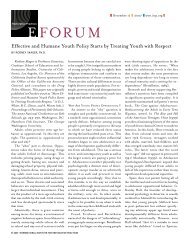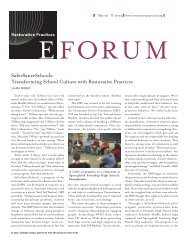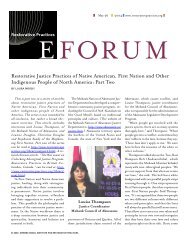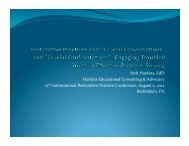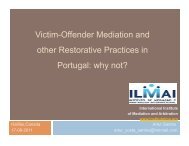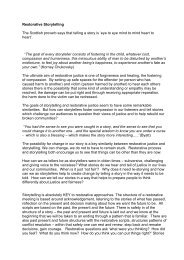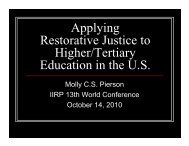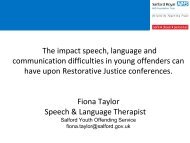Between Wholeness and Restoration - IIRP
Between Wholeness and Restoration - IIRP
Between Wholeness and Restoration - IIRP
Create successful ePaper yourself
Turn your PDF publications into a flip-book with our unique Google optimized e-Paper software.
each consensus on the topic. Rather they allow all voices to be<br />
respectfully heard <strong>and</strong> offer participants diverse perspectives to<br />
stimulate their reflections.” (p. 14)<br />
Through this paper I envision the bringing together in a circle a variety of people who can<br />
inform the development of a comprehensive theory of restorative justice. Each gives<br />
voice to a particular perspective. In such a way, the conversation regarding a theoretical<br />
framework will be stimulated to better underst<strong>and</strong> why it is that restorative practices<br />
change peoples’ lives.<br />
The Principles of Restorative Justice <strong>and</strong> Restorative Practice<br />
Restorative Justice began anew in the 1970’s as an attempt to address limitations <strong>and</strong><br />
needs in the current criminal justice system in the Western world. I use the word anew to<br />
indicate that the principles of restorative justice in <strong>and</strong> of themselves are not new <strong>and</strong><br />
have been the cornerstone of many non-Western, indigenous cultures <strong>and</strong> various<br />
religions from their beginnings. However, “during colonization, the Western legal model<br />
often condemned <strong>and</strong> repressed traditional forms of justice” (Zehr, 2002, p. 43,) <strong>and</strong><br />
became the dominant manner in which justice was carried out <strong>and</strong> often understood. The<br />
Western legal model that restorative justice calls into question can best be described as a<br />
retributive model that focuses on the responsibility of the state to punish offenders of<br />
justice in such a way that the public perceives that the guilty get what they deserve for the<br />
crime committed <strong>and</strong> believe justice has been done. Proponents of restorative justice<br />
point out that this process of justice does not contribute to healing or peace but rather<br />
deepens societal wounds <strong>and</strong> conflicts (p. 3). In its stead restorative justice presents an<br />
alternative that focuses on repairing the harm done to people <strong>and</strong> relationships.



